
By Baboloki Semele: As the world continues to grapple with an array of existential challenges—climate change, displacement, conflict, and the widening gap of inequality—the future remains uncertain. Yet, amid these crises, global leaders, communities, and civil society are determined to carve out a path toward a more equitable, peaceful, and prosperous world. One of the key areas of focus is gender equality and women’s rights, critical components of the Pact for the Future, which forms the cornerstone of discussions at the Summit of the Future.
Held in New York on September 20-21, 2024, the summit brought together key actors from government, civil society, the private sector, and youth to forge a collective vision for tackling the interconnected challenges of our time. The Pact for the Future presents an ambitious roadmap for addressing these challenges, but more importantly, it emphasizes the need for translating high-level commitments on gender equality into transformative action on the ground. Without concrete steps, the promises made at global summits risk becoming mere rhetoric, falling short of the real systemic change urgently needed.
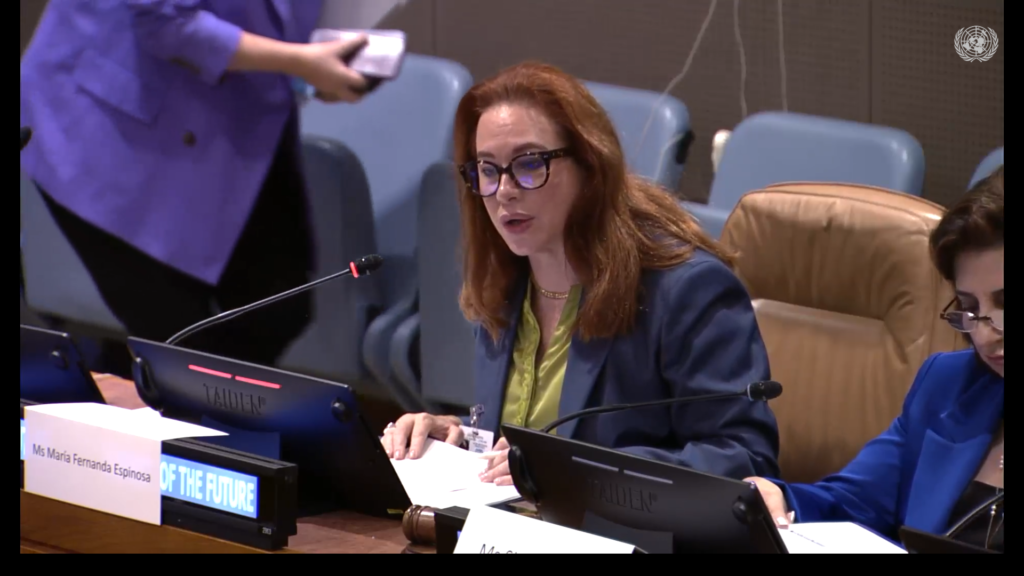
At a side event during the summit, Maria Fernanda Espinosa, Executive Director of Global Women Leaders for Change and Inclusion, moderated a panel discussion titled “Translating the Gender Equality and Women’s Rights Commitments of the Pact of the Future into Transformative Action”. Her opening remarks encapsulated the sense of urgency surrounding this topic. She highlighted that, despite progress in advancing gender equality globally, “it will still take a staggering 137 years to lift all women and girls out of poverty.” The data from recent gender snapshots paints a sobering picture, showing that none of the indicators under Sustainable Development Goal (SDG) 5—gender equality—are on track to be fully met.
This reality is not due to a lack of effort or vision. Governments, institutions, and movements worldwide have made bold commitments to ensure that women and girls can participate fully, equally, and meaningfully in all aspects of political, economic, and social life. However, as Espinosa pointed out, “while these commitments are bold, they are only the starting point.” The real challenge now is turning these visionary principles into accountability frameworks and lasting reforms that make a tangible difference in the lives of women and girls.
The Summit of the Future stands as a pivotal moment for the global community to come together, reflect on these commitments, and push forward with concrete actions that will bring about the change we so desperately need. The Pact for the Future recognizes that without the full participation and leadership of women at every level of decision-making, we cannot hope to achieve the broader goals laid out by the UN Charter and the Sustainable Development Goals.
The Action Days of the summit set the stage for advancing this agenda. They serve as a platform for diverse stakeholders—from heads of state and ministers to grassroots activists, private sector leaders, and academics—to engage in meaningful dialogue and collaboration. The focus is not just on discussing the issues but on finding innovative solutions and pathways for real progress. Key themes such as digital innovation, peace and security, and sustainable development were explored, with an emphasis on the future generations—particularly women and girls—who will inherit the outcomes of today’s choices.
Espinosa’s call to action reminds us that the real test lies not in making commitments but in delivering on them. “Our focus,” she noted, “must be on how to move from words to action, and how to ensure that the commitments made for gender equality and women’s rights in the *Pact of the Future* really lead to transformative results, not only in the multilateral architecture but also with impacts on the ground.”
This sentiment resonates deeply. For too long, gender equality has been viewed as a secondary issue—an isolated area of concern that could be addressed in silos. Yet, as the summit discussions revealed, it is increasingly clear that gender equality is fundamental to solving the broader challenges facing our world today. Whether it’s combating climate change, fostering innovation, ensuring peace and security, or achieving sustainable economic growth, the participation of women at all levels of society is not only desirable but essential. The panelist made it clear that as we move on from the Summit of the Future, the task before us is clear. The commitments laid out in the Pact for the Future must be transformed into systemic change that is felt by women and girls in every corner of the globe, adding that this means implementing concrete policies, creating accountability mechanisms, and ensuring that resources are allocated to empower women at all levels of decision-making.
The panelists also anchored that the journey toward gender equality is far from over, but the Summit of the Future offers a critical opportunity to accelerate progress. They emphasized that the path ahead requires a collective effort—one that involves governments, civil society, the private sector, and, crucially, the voices of women and girls themselves as it is only by working together can a world where gender equality is not just an aspiration but a lived reality for all be created.
Inaction, as Espinosa warned, is not an option as now is the time to act, to transform commitments into transformative action, and to build a future where the rights and voices of women and girls are not only recognized but are central to the shaping of a more just, inclusive, and sustainable world.

One of the side event’s key moments came as a presentation by Queen Mathilde of Belgium, who underscored the gravity of the situation. “In 2024, we continue to face systemic barriers across many aspects of life,” she said. “Economic opportunities, representation at decision-making levels, education, and healthcare access remain critical issues.” She noted that progress towards SDG 5 has been alarmingly slow, with only two out of 18 indicators close to target.
Queen Mathilde emphasized the persistent nature of gender-based violence and the pay gaps that continue to harm women’s mental health and overall well-being. “Millions of women and girls still lack adequate education and healthcare,” she said, adding that over 340 million women and girls are projected to live in extreme poverty by 2030. This grim forecast is exacerbated by ongoing crises, instability, and the worsening effects of climate change, all of which disproportionately impact women and girls. “We are witnessing a troubling backlash against gender equality,” the Queen warned, noting that longstanding human rights are increasingly under threat.
Despite these setbacks, Queen Mathilde noted that there are opportunities for progress. The upcoming years—2024 and 2025—represent a crucial window for advancing the gender equality agenda. Queen Mathilde pointed to the Summit of the Future and the 30th anniversary of the Beijing Declaration as key moments to reassert the importance of gender equality. These events can act as catalysts for addressing systemic inequalities, ensuring women’s active participation in leadership roles, and accelerating action on the commitments made under the Pact for the Future.
She also spoke to the UN Secretary-General Antonio Guterres’ Gender Equality Acceleration Plan, which places women’s rights at the center of the UN’s efforts across peace, development, and human rights. Yet, the success of this initiative hinges on the collaboration of member states, civil societies, and stakeholders across all sectors. She stressed the importance of collective action, stating, “We must make the most of this window of opportunity to reaffirm and mobilize around these goals.”
Queen Mathilde shared insights from her recent field visits to Bangladesh, Vietnam, and Ivory Coast, where she witnessed firsthand the transformative role women play in building sustainable and inclusive societies. In Ivory Coast’s cacao plantations, for example, women are at the forefront of managing the finances and marketing of their chocolate businesses, demonstrating how empowering women can lead to community-wide benefits.
“In my trips, I met so many women who want to create the means for a decent life for their children and families,” the Queen recounted. “Let us support them.” This sentiment echoes the broader theme of the Summit of the Future: that gender equality is not an isolated issue, but a linchpin for achieving all global development goals. Whether in economic growth, climate resilience, or social stability, the full participation of women is not only essential but indispensable.
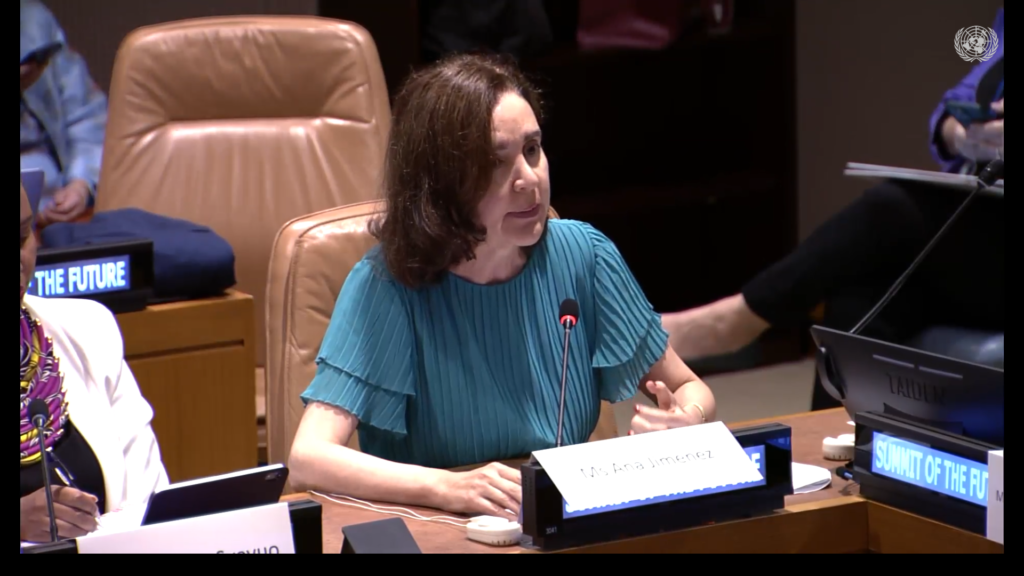
Spain’s Deputy Permanent Representative to the United Nations, Ambassador Anna Jimenez, also took the stage, reinforcing the need for gender equality to be mainstreamed in global discussions. “During negotiations in the European Union, Spain was determined to ensure that women’s rights and gender equality were integral parts of the Pact for the Future, not just as a single action, but woven throughout the text,” she explained. Jimenez further emphasized Spain’s commitment to gender equality through its feminist foreign policy. “When a country adopts a feminist foreign policy, it ensures that gender equality is embedded in every initiative, contributing to progress in implementing SDG 5,” she said.
Jimenez also highlighted the importance of ensuring that women’s rights defenders and civil society play a critical role in the implementation of the pact. “The negotiations around human rights defenders were particularly challenging, but their involvement is essential if we truly want to reinforce the international community and make gender equality a reality,” she remarked.
Ambassador Jimenez highlighted the importance of localization in achieving the pact’s goals saying at the end of the day, the implementation of gender equality must be done at the local level. She explained that Spain has been a strong advocate of localization when it comes to implementing the SDGs. Spain, hosts the global secretariat of the Local 2030 initiative, champions the approach that change needs to happen on the ground to truly make a difference.
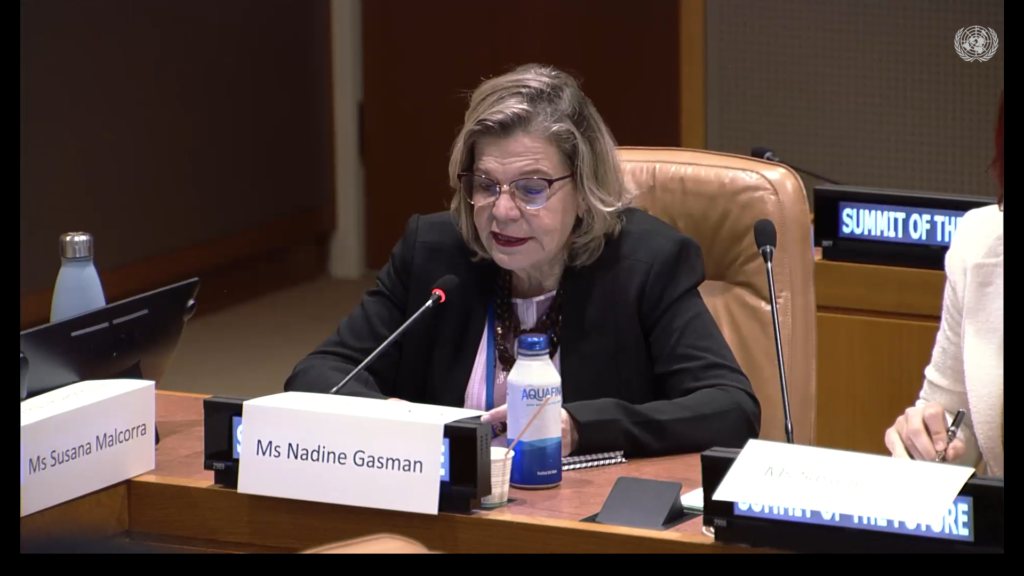
Nadine Gasman, President of Mexico’s National Women’s Institute, delivered a speech emphasizing Mexico’s commitment to placing people, especially the most vulnerable, at the center of its development paradigm. Representing both the government and President Andrés Manuel López Obrador, Gasman stressed that change comes from policies focused on people, leading to well-being, inclusion, and sustainable development.
Gasman highlighted that Mexico’s feminist foreign policy, presented at the third Feminist Foreign Policy Conference in July, sought to enrich and incorporate gender perspectives into the five themes of the Summit of the Future. This high-level event, which featured representatives from over 40 countries and international organizations, led to a declaration by 20 countries emphasizing the importance of women’s and girls’ rights in the implementation of the Pact for the Future.
A key takeaway from the conference was that advancing gender equality and the SDGs requires increased financing specifically focused on women. Gasman called for urgent actions to prevent millions of women from falling into extreme poverty by 2030, emphasizing that care work should be accounted for in the gross domestic product (GDP) to shape economic and social policies.
On the Women, Peace, and Security agenda, Gasman advocated for institutionalizing practices that promote meaningful participation of women in peacebuilding processes, considering structural inequalities and harmful masculinities as barriers to progress. She also pointed to technology-facilitated gender-based violence as an extension of patriarchy into the digital realm, urging a multi-sectoral response to this growing issue.
Addressing youth participation, Gasman underscored the need to provide specific funding for youth to participate in decision-making spaces, noting that young voices reminded us of the importance of diverse perspectives on key issues such as sexual and reproductive rights and cultural change.
Gasman reminded attendees that gender equality is foundational to sustainable development. She expressed concern that the language of the Pact for the Future had lagged behind on gender perspectives, especially in a world marked by polarization and the backlash against women’s rights. She called for collective action to ensure that women, adolescents, and girls in all their diversity are visible in the Pact, addressing intersecting forms of discrimination that hinder their autonomy. Gasman made it clear that without placing women at the center of policies and ensuring their inclusion in global governance, the future will be incomplete. She urged coordinated efforts to materialize the gender perspective in foreign policy, underscoring that this is a historical debt owed to women and youth globally.
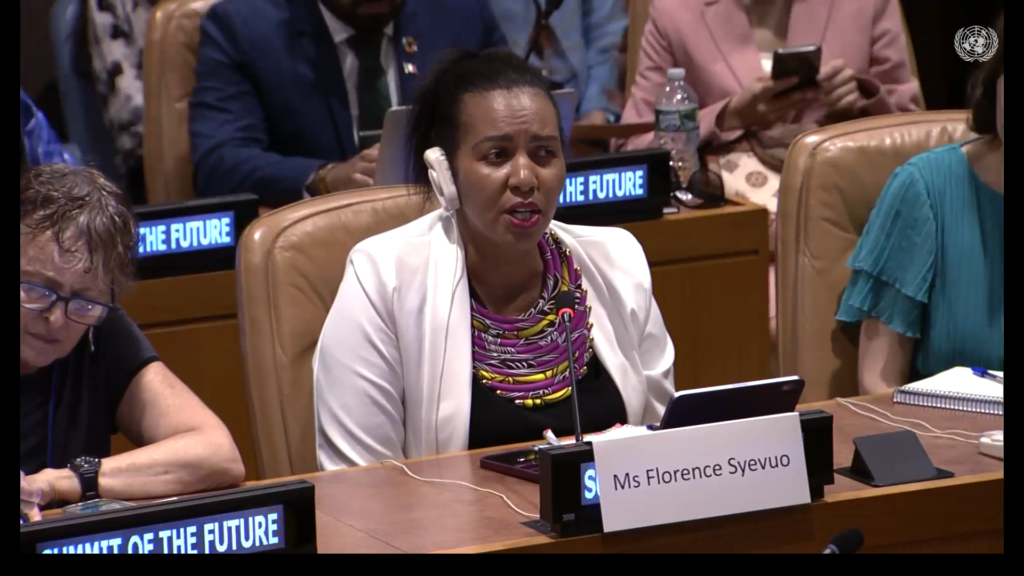
Florence Syevuo, Executive Director of SDGs Kenya Forum and co-chair of the UN We Need, added to the discussion by reflecting on the stark realities facing women and girls, particularly in Sub-Saharan Africa and the Global South. Syevuo emphasized that while the Summit of the Future presents a “once-in-a-generation” opportunity for change, the critical question remains: will this be a realistic opportunity?
Speaking from her experience in Kenya, Syevuo highlighted pressing issues such as high maternal mortality rates, intimate partner violence, gender-based violence, forced marriages, and female genital mutilation. These ongoing challenges underline the need for global gatherings like the Summit of the Future to result in concrete outcomes that go beyond mere discussions and translate into real change for those most affected by these issues. She poignantly noted the tragic murder of a female runner in Kenya upon her return from international success, underscoring the vulnerability of women and girls.
Echoing the call for collective action on gender equality, Syevuo urged leaders and stakeholders gathered at the summit to reflect deeply on their priorities and objectives. She stressed the importance of financing as a critical issue hindering progress toward achieving the Sustainable Development Goals (SDGs). The broken promises in official development aid, coupled with mismanagement of funds at both local and international levels, contribute to the slow progress many countries are experiencing. With just six years left to achieve the 2030 agenda, Syevuo called for greater accountability from governments, urging them to follow through on their commitments.
Syevuo’s concerns about the gap between reality and the reports presented during Voluntary National Reviews (VNRs) were especially resonant. She noted that while some countries present “rosy reports,” they often fail to reflect the real struggles faced by their populations. This highlights the need for better monitoring, tracking progress, and the involvement of civil society in holding governments accountable.
She emphasized the need for inclusive global governance that not only addresses gender inequalities but also recognizes and empowers women, girls, and youth in all their diversity. Syevuo urged the global community to address the severe gender-based violence and inequalities that persist in the Global South.
The underlying message in her presentation was clear: gender equality is not just a goal but the foundation of sustainable development. Without meaningful participation of women, youth, and girls, and without addressing structural inequalities, true progress toward a fair and prosperous future is impossible. She therefore called for immediate, actionable steps to make gender perspectives central to global governance and to ensure that the next time such discussions are held, they would no longer be marked by reports of unfulfilled promises but by tangible progress. Syevuo encouraged stakeholders to reflect on their legacy. She posed the poignant question: “What will we be known for when the curtains close?” Her challenge to the audience was to ensure that their actions today will lead to a future where women and girls no longer face these systemic barriers but instead are empowered to lead their communities in peace, prosperity, and equality.
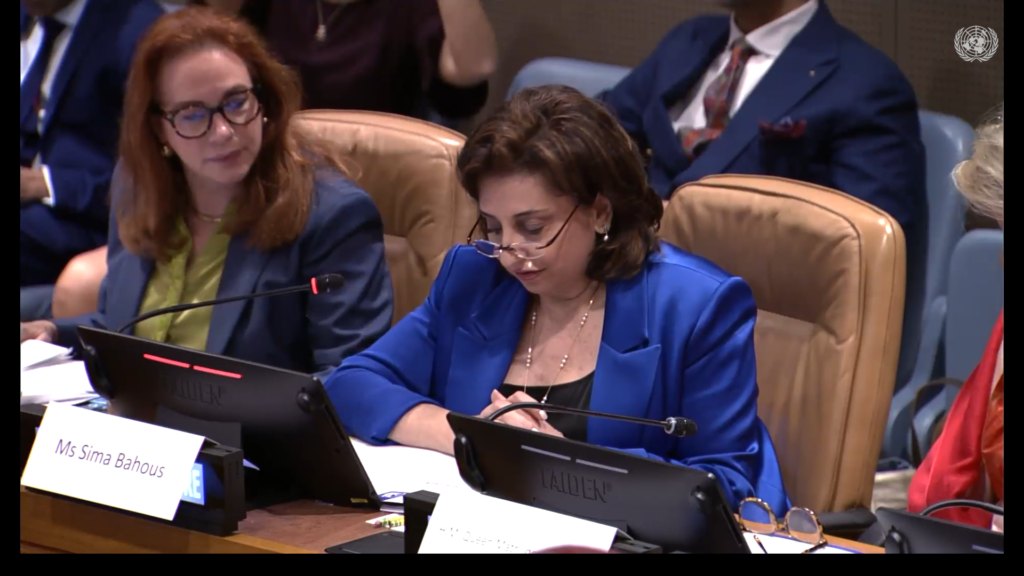
Sima Sami Bahous, Executive Director of UN Women, reinforced these concerns, stressing the global gender inequality that remains a critical obstacle to achieving the SDGs. Bahous applauded the inclusion of gender mainstreaming in the Pact for the Future and called for the continued focus on women’s leadership and participation in political and economic life. Her data-driven approach, citing alarming statistics from the SDG Snapshot Report on gender equality, starkly illustrates how far the world still have to go. She says for example, it will take 137 years to eradicate extreme poverty for women and girls if current trends persist. Furthermore, she notes that 612 million women and girls already live amidst conflict, where they face increased risks of sexual violence. These challenges, along with issues like the digital divide and the impact of climate change, underscore the need for urgent action.
Bahous also emphasized the significance of revitalizing the Commission on the Status of Women (CSW) to ensure that it is fit for purpose and accountable to the needs of women globally. She reaffirmed the United Nations’ commitment to gender equality and called for collective efforts to keep women and girls at the center of sustainable development, peace, and human rights efforts.
Her voice echoed that the future of sustainable development, peace, and justice cannot be realized without tackling the systemic inequalities that disproportionately affect women and girls. She argued that gender equality is not just a cross-cutting issue but the foundation upon which a just and equitable future must be built. The panelists called for stronger accountability, accelerated progress, and the full participation of women and girls. Their call offers a roadmap for global leaders as they gather for the Summit of the Future and work towards finalizing the Pact for the Future.
